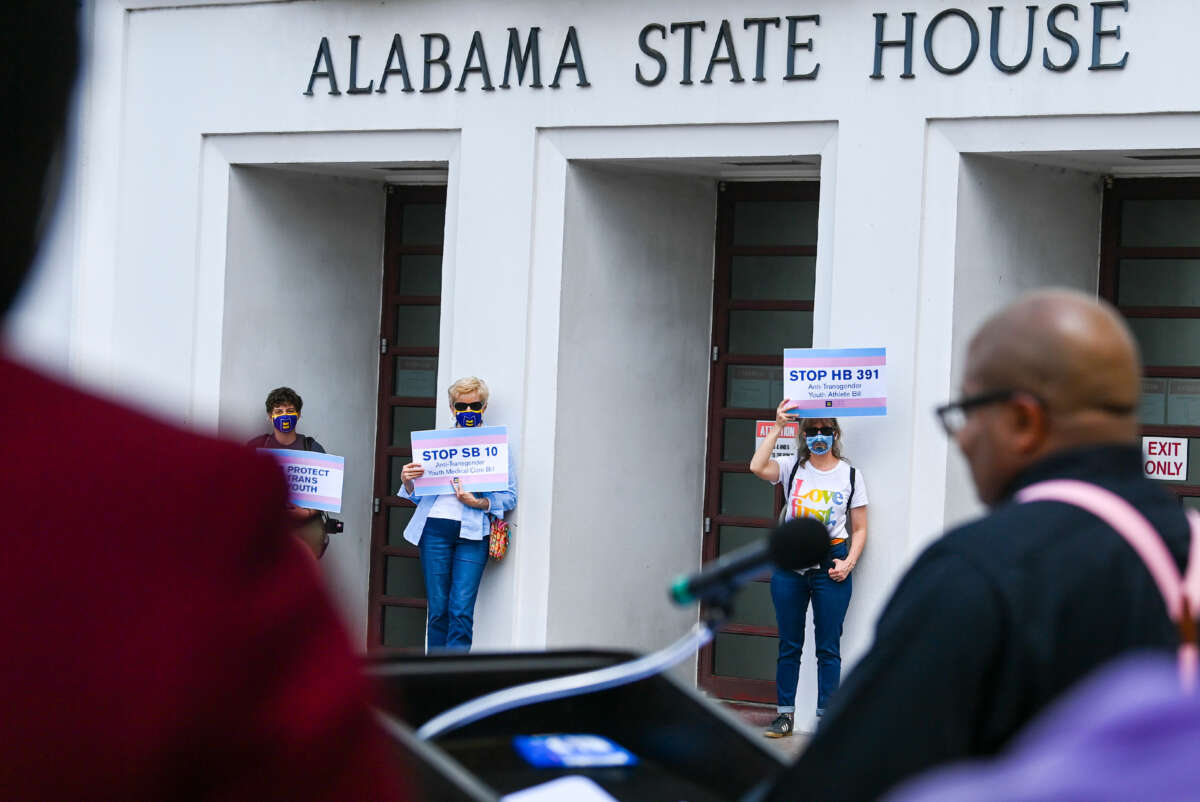On Tuesday, a U.S. District judge in northern Alabama refused to grant a federal petition to put on hold, for now, plans to have an appellate court consider the legality of a ban on gender-affirming care for transgender youth in the state.
The request for a delay came from the U.S. Department of Justice (DOJ). While the department largely sides with the idea that bans on gender-affirming care treatments are illegal, the DOJ requested the stay due to the “landscape” of the issue “quickly evolving” in other federal courts, lawyers for the department said.
U.S. District Judge Liles Burke, who serves in the Northern District federal court in Alabama, ordered the case to proceed as planned. A hearing is set to take place in April, with the 11th Circuit Court of Appeals hearing challenges to a previous federal court order disputing the law.
The so-called Vulnerable Child Compassion and Protection Act, enacted in April 2022, makes it a felony, punishable by up to 10 years in prison, for any doctor in the state to give gender-affirming treatment to people under the age of 19 if it involves the use of medication or surgery, including the use of reversible puberty blockers or hormone treatment. Burke placed an injunction on the law in May of last year, disputing Alabama officials’ arguments that gender-affirming care protocols were “experimental.”
“The uncontradicted record evidence is that at least 22 major medical associations in the United States endorse transitioning medications as well-established, evidence-based treatments for gender dysphoria in minors,” Burke said at the time.
Twenty-two states in the U.S. have enacted laws that ban or restrict gender-affirming care for minors. Most of those bans are currently facing court challenges, and several transgender children and their families have requested the Supreme Court to review an appellate court decision upholding bans in Kentucky and Tennessee.
Gender-affirming care, including treatment for children, is proven to be life-saving. Besides being recognized by virtually all major medical organizations in the U.S. as being both safe and beneficial, recent empirical studies have also demonstrated that gender-affirming care reduces depression and suicidality rates for trans individuals who receive it.
Bans on such care, such as the Alabama law that is being challenged, have the opposite effect, causing transgender people to feel less safe in their communities and in states where they’ve been enacted. A Human Rights Campaign (HRC) poll in August, for example, found that 42.9 percent of LGBTQ adults said that gender-affirming care bans impacted their physical and/or mental health. For transgender people specifically, the poll found that 80.1 percent said as much.
“I feel like I have less value or right to be here than my cisgender neighbors and community,” an unidentified transgender man living in Idaho said to HRC pollsters. “I am now afraid of them, and the harm they might intend towards me.”
We’re resisting Trump’s authoritarian pressure.
As the Trump administration moves a mile-a-minute to implement right-wing policies and sow confusion, reliable news is an absolute must.
Truthout is working diligently to combat the fear and chaos that pervades the political moment. We’re requesting your support at this moment because we need it – your monthly gift allows us to publish uncensored, nonprofit news that speaks with clarity and truth in a moment when confusion and misinformation are rampant. As well, we’re looking with hope at the material action community activists are taking. We’re uplifting mutual aid projects, the life-sustaining work of immigrant and labor organizers, and other shows of solidarity that resist the authoritarian pressure of the Trump administration.
As we work to dispel the atmosphere of political despair, we ask that you contribute to our journalism. Over 80 percent of Truthout’s funding comes from small individual donations from our community of readers, and over a third of our total budget is supported by recurring monthly donors.
You can help by giving today. Whether you can make a small monthly donation or a larger gift, Truthout only works with your support.
